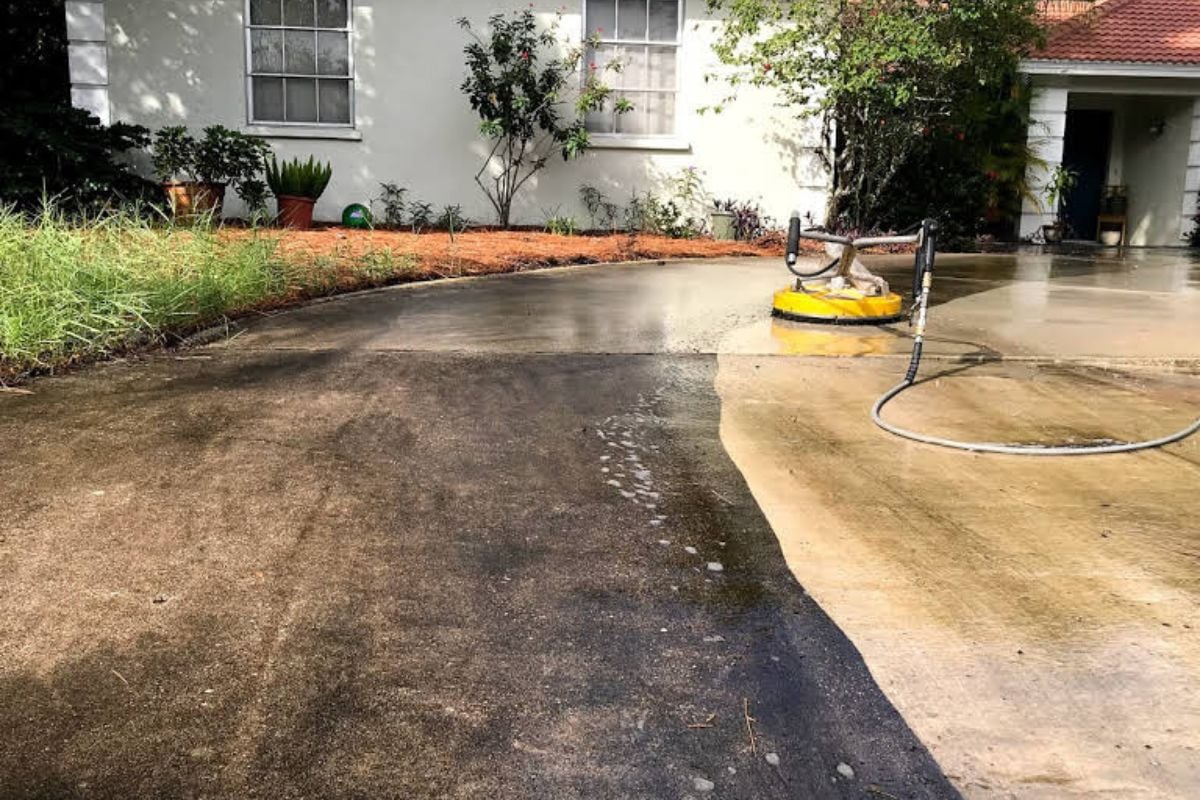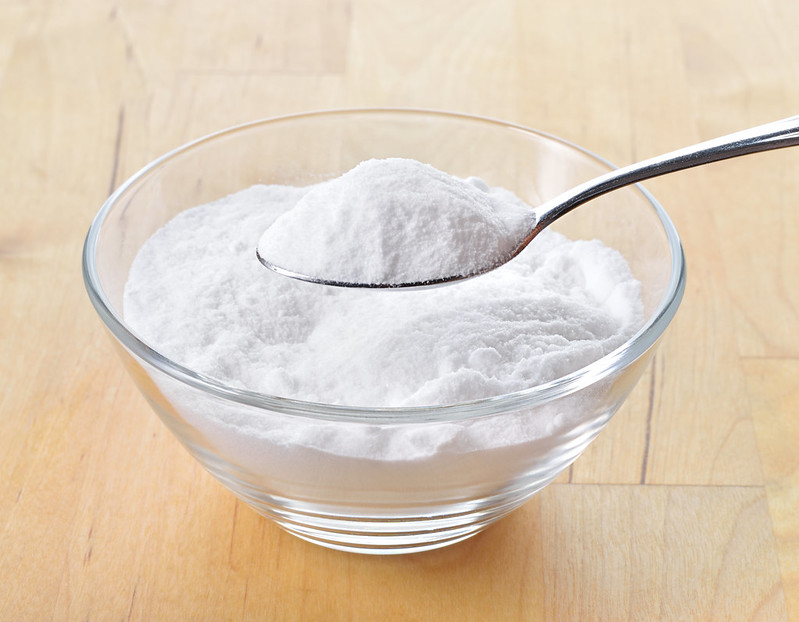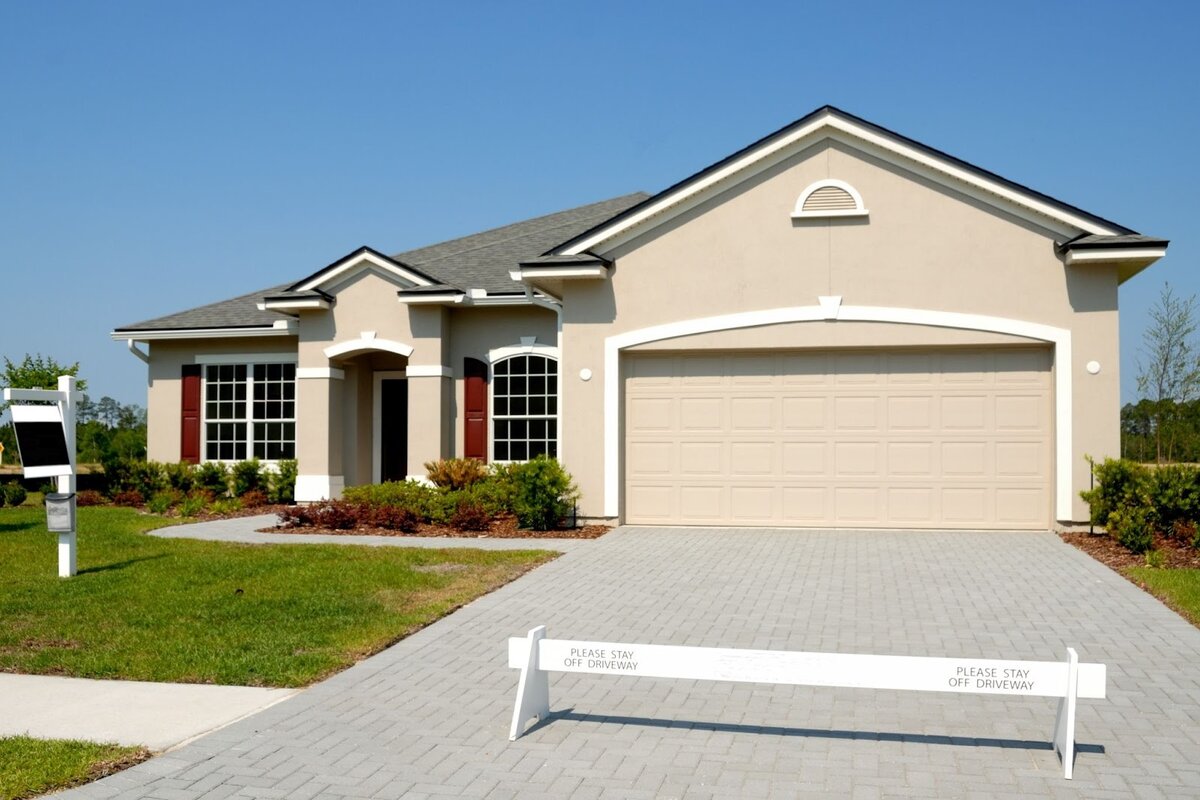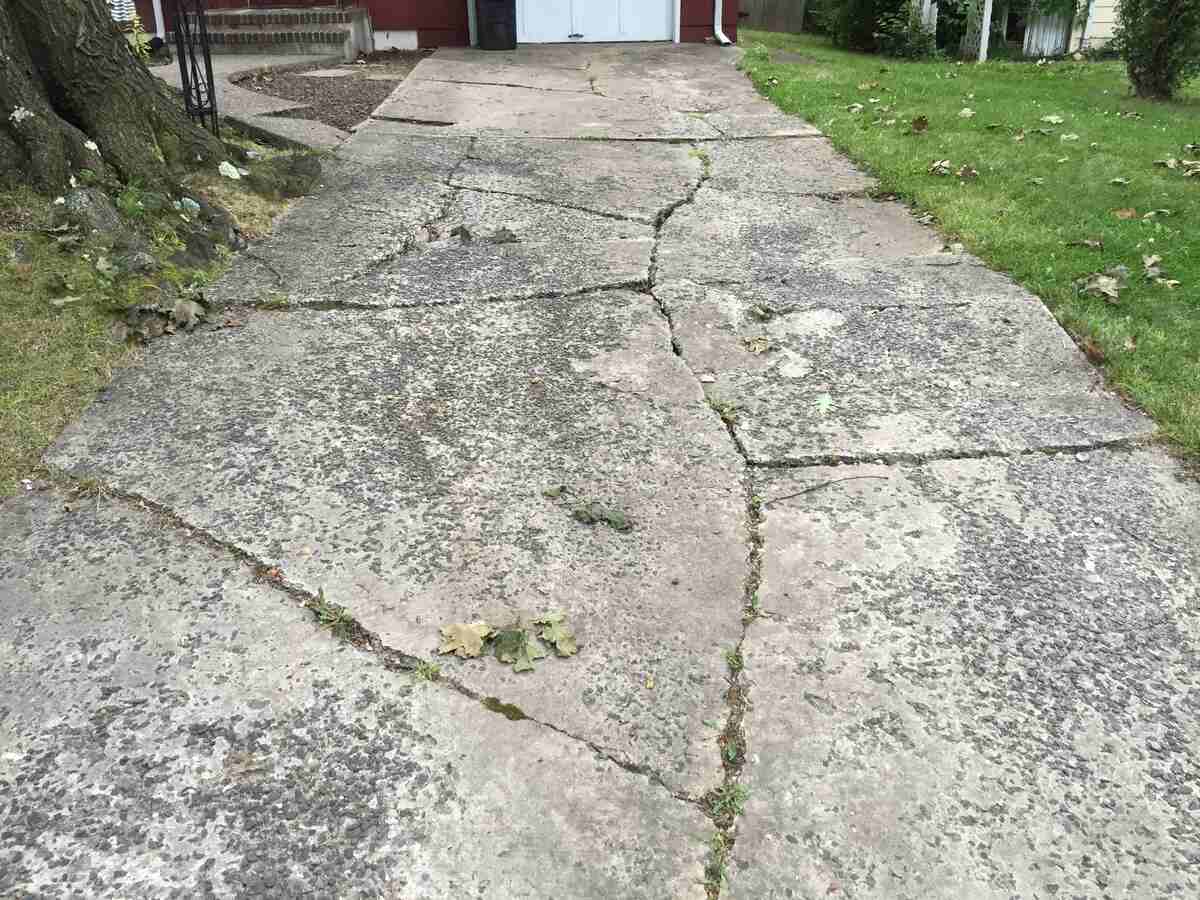
Concrete, stamped concrete, pavers, and even gravel driveways can attract stains that detract from your home’s curb appeal. Asphalt driveways don’t show dark stains but can still benefit from a clean-up once in a while.
And although these blotches can be stubborn, they aren’t that difficult to eliminate if you know how to clean stains in your driveway.
In this article:
- Determining the Cause
- Cleaning Costs, DIY and Professional
- Supplies You’ll Need
- Best Cleaning Products
- Step-by-Step Instructions for Different Types of Stains
- Safety Precautions
- FAQ
Determining the Cause
If you’re familiar with treating laundry stains, you know it’s important to determine what kind of stain you’re dealing with. Different stains require different approaches and different cleaning methods.
- Rust: Brown or dark orange, and it might be somewhat powdery. You can likely touch the stain and get a dust-like substance on your skin.
- Oil and Grease: Oil stains are darker brown and can feel slippery on your skin. Gear oil and grease are darker brown with a foul smell. When wet, they all display a sheen; water will bead up on top of the stain.
- Leaves: These stains are shades of brown and often include a leaf or two (or their outline) as a dead giveaway.
- Vehicle Fluids: Coolant leave a faint green stain on your driveway with a slightly sweet smell. Transmission fluid is slightly opaque with a reddish tint.
- Tire Marks: These stains appear as black or dark gray streaks on the driveway’s surface and may even show tire treads.
- Ice Melt: These stains are usually white and crusty from the product’s mineral salts that melt ice.
- Plant Food: Over time, the metal compounds in fertilizers rust, turning the stains orange.
- Pet Urine: Stains may appear darker in color than the surrounding driveway and have a noticeable smell.
How Much Does it Cost to Clean a Driveway Stain?
Cleaning a stain is relatively inexpensive compared to the cost of resurfacing or even sealing your driveway. You may even be in luck and have all the supplies you need on hand. However, if you don’t have everything, you can expect to pay less than $50, sans a pressure washer.
If you’re not feeling the DIY vibe, you can typically find a local professional cleaning company to come in, and power wash your concrete driveway for $100 to $200. The price will vary based on the size of the driveway and the amount and type of staining.
Supply List
- Cleaning product(s) for your specific type of stain
- Stiff nylon brush
- Bucket and hot water
- Garden hose or pressure washer (optional but very helpful)
- Rubber gloves
- Eye protection
Best Cleaning Products
Many household products are effective cleaners, but there are times the stuff from around your home won’t cut it, and you’ll need to invest in a heavy-duty, professional cleaning product from your local hardware store.
Here are some of the common household products that might work.
Baking Soda

Surprisingly, baking soda is excellent at removing many stains, including those on the driveway. It ‘s even effective on most vehicle-related stains.
Baking soda is a mild alkali that dissolves organic compounds like dirt and grease in water so you can remove them easily. Each baking soda particle also acts like a gentle abrasive, so it cleans without leaving scratches.
Vinegar
Vinegar is commonly used as a household cleaner because of its acidic properties. This natural, nontoxic cleaning marvel removes mineral deposits, dirt, sticky residues, and grime. It also helps deodorize surfaces.
You usually create a cleaning solution by mixing vinegar and water at different ratios. It can struggle with heavy oil and grease stains, and you should also do a spot test before cleaning since it may damage some surfaces.
Liquid Dish Soap
Liquid dish soap has many uses beyond washing your dishes. The household cleaning agent is also incredibly effective at removing plant-based stains (after all, it’s made to tackle stuck-on food).
When combined with a stiff bristle brush, you’ll be able to knock out unsightly stains on your concrete or brick driveway without worrying that residue will harm your grass or flowers when it’s washed off.
However, liquid dish soap isn’t that effective with automobile stains like oil and grease. You’ll need something stronger.
Cat Litter
Cat litter is another double-duty household item. Its absorbent properties are great for soaking up stains like motor oil, transmission fluid, and other liquids that drip off your vehicle onto your driveway.
Just sprinkle it across the stain and let it sit a while until it absorbs the spill. Then sweep it and discard it.
Oven Cleaner
Try oven cleaner on tough engine grease or transmission fluid stains on your driveway. These solutions are designed to break down grease, and then can be wiped away or rinsed clean.
Be careful, though—oven cleaner is very caustic. Avoid getting it on your skin, and don’t inhale it. You’ll also want to be careful it doesn’t get onto your grass or in your flower or garden beds because it will kill any plant it contacts.
Cola
So, I have some bad news for you dark soda drinkers! Soda pops like Coca-cola and Pepsi contain citric acids, carbonic acid, and phosphorus acid that work together to remove grease stains.
They are highly effective at cleaning vehicle-related grease and oil stains but only moderately good at removing other types. (On a side note, what do they do to your stomach if they can lift motor oil?)
Powdered Laundry Detergent
Like dish soap, powdered laundry detergent is good at removing many driveway stains, especially ones left from dead leaves, ice melt, and plant food. Detergent contains surfactants, tiny molecules that let water get into the stain and lift it from the surface.
Commercial Cleaner
DIY mixtures using standard household supplies may not cut it for cleaning tough stains. In these cases, you’ll need to buy a dedicated stain remover to clean your driveway.
Note: Always research the cleaners before making a purchase. Different formulations are available based on your driveway type.
Step-By-Step Instructions for Cleaning Stains
It doesn’t matter what type of stain you’re dealing with. The basic cleaning steps are the same, regardless.
- Remove any liquid or solid residue from the driveway surface. Kitty litter is incredibly effective at absorbing liquids and may even pull up the stain. You can also use sawdust, cornmeal, corn starch, and baking soda to absorb moisture.
- Saturate the stain with a generous amount of your chosen cleaning product.
- Let it set for a while to begin breaking up the stain particles.
- Scrub with a stiff bristle brush until the stain lifts.
- Rinse the driveway with clean water.
Now, let’s talk about specific types of stains.
Rust
Relatively new stains are much easier to treat than old and dried ones. So, as soon as you see the ugly orange stain, you need to clean it instead of putting it off for another day.
Pour undiluted vinegar directly onto the rust and let it soak for 10 to 15 minutes. Scrub the mark with a stiff nylon brush and watch it slowly disappear. Rinse the area with clean water, and repeat until the spot is gone.
Oil or Grease
Old oil stains are difficult to remove, especially when they’ve sat for some time and thickened up from moisture loss.
When the stain is new, cover it with kitty litter or another absorbent material and leave it to set for an hour at minimum. Overnight is good if the oil spill is significant. These materials absorb excess oil. Then sweep up the material so you can examine the spot. If there is still residue on your driveway, move on to the next step.
For stubborn stains, coat them in laundry detergent, baking soda, or cola, and use a stiff brush to work the cleaner into the top layer of your driveway. Once everything has come up, rinse it well using your hose or power washer.
Foliage
Cleaning stains on your driveways from fallen leaves (or even trash bags of grass clippings that may have leaked) is easy but takes a little elbow grease. Mix a cup of liquid dish soap or powdered laundry detergent with warm water in a large spray bottle, and then spritz the solution on the stains. Grab your scrub brush and scour until the marks lifts from the concrete.
Then use your garden hose or pressure washer to wash it away, including any errant soggy leaves.
Vehicle Fluids
Your vehicle’s other fluids aren’t as thick and viscous as engine oil and grease, so you’ll take a slightly different approach when cleaning these stains.
For fresh stains, apply kitty litter or another absorbent material to soak up excess liquids. After an hour or so, scoop everything up, and move on to cleaning.
Coolant and brake fluid are water-soluble, so start by wetting the stain with your garden hose. Give it a little time to dissolve the stain, then scrub the area with dish soap or laundry detergent and rinse well.
Another way to clean these stains is to saturate them with water, cover them in a layer of soap or detergent, and lay newspaper over everything. Wet the newspaper and let everything set for a couple of hours until it is completely dry. Pull up the paper, dip your scrub brush in water, and work at the stain until you get thick, lathery suds. Then rinse.
Tire Marks
Liquid dish soaps and powdered laundry detergent are good for removing tire marks from your driveway since they have mild degreasing properties. Mix one cup of soap with warm water and spray or pour it onto the stain. Scrub lightly, and then rinse it clean.
If dish soap doesn’t work, try using vinegar and water solution (50:50) to see if that lifts the marks. For really stubborn stains, you can try a commercial degreaser, a citrus cleaner, or solvent like automotive brake fluid. Always be careful to follow directions and wear protective eyewear.
Ice Melt
Salt residue left on your driveway can be corrosive, depending upon the formulation of the deicing product.
To lift salt stains, start with a vinegar and water solution or a household product containing a surfactant, e.g., powdered laundry detergent or liquid dish soap. Scrub the area with the cleaning solution using a stiff bristle brush, and rinse well.
Plant Food
We talked above that plant food stains are rust from the metal minerals in fertilizer. Therefore, you’ll want to tackle the stain just like rust.
It’s essential to clean these stains as quickly as possible, though. Plant food will attract moisture and, in turn, create a weak acid that corrodes concrete over time.
Pour undiluted vinegar or a 50:50 vinegar and water solution onto the stain, scrub lightly with a nylon bristle brush, and then rinse with plenty of water. Repeat as necessary. If vinegar doesn’t work, try dish soap or laundry detergent before attempting a stronger commercial cleaner.
Pet Urine
If your pet had an accident on your driveway, you are probably looking at a stain you’d like to eradicate. In this case, you’ll want to put on a mask because this stain will smell when you’re working on it.
Sprinkle baking soda across the stain, and then spray it with a little bit of water. When it bubbles up, scrub it with a nylon brush and then rinse it away. If the odor lingers, try dousing the area with vinegar, letting it set for a few minutes, and then rinsing it clean.
The next step is to try an oxygenated pet cleaner containing enzymes for smells that still stick around. These products are formulated to break down urine molecules and eliminate odor.
Safety Precautions
- Even though some products are frequently used in your home, they can still be harmful after prolonged use or exposure. Keep your hands and eyes protected.
- If you wash cleaner off your driveway into your lawn, use plenty of water to dilute the cleaner. Some of these items will quickly damage your grass and plants at higher concentrations.
- Always read the directions thoroughly on commercial driveway cleaners to minimize damage to your driveway, yourself, and the surrounding environment.
- Always test your cleaner on a small, out-of-the-way section of your driveway before cleaning the stain. If the product damages your drive, it won’t be in an obvious spot.
- Regardless of your product, you may need to clean the stained area more than once to fully lift the discoloration from your driveway.
Preventing Driveway Stains
Even with the best intentions, accidents (and oil leaks) happen, and we wind up with stains on our driveway. One of the best ways to prevent this is to seal your driveway.
It increases the lifespan of your driveway and adds to your curb appeal. The average cost of driveway sealing is $305.
FAQ
No, you don’t need a pressure washer to clean your driveway! Pressure washing makes the job easier, but if you use the correct type of cleaner, you shouldn’t need more than your garden hose or a bucket of water.
Brown or brownish-red stains are rust. You might see rust stains from metal planters, basketball hoops, or even the axle and wheels on your garbage can. Just like metal rusts when it oxidizes, minerals in the water or minerals pulled from natural stone (brick, pavers, etc.) create rust stains .
You should avoid using a wire brush to clean your driveway, regardless of the stain or the driveway type. Wire brushes are too abrasive and will leave scratches and scuffs on the surface. At most, use a stiff-bristled nylon brush. If you’re struggling to clean the stain, try using a more powerful cleaner instead of a more abrasive brush.
Bleach is effective at cleaning standard concrete surfaces but should be avoided if you have stained concrete or colored pavers. If used on these driveways, it will pull the color out of the material. Since there are other household cleaners that work well, it’s best to try one of them.
Need Help?
Cleaning driveway stains is typically an easy project that you can undoubtedly DIY. But if your DIY has turned into a “D-I-why-did-I-try-to-do-this-myself,” reach out to the professionals for help! Contact one of our specialists to get a driveway cleaning or repair quote.
Main Photo by: Fidelity Pressure Washing Sarasota / Wikimedia Commons / CC BY-SA 4.0




